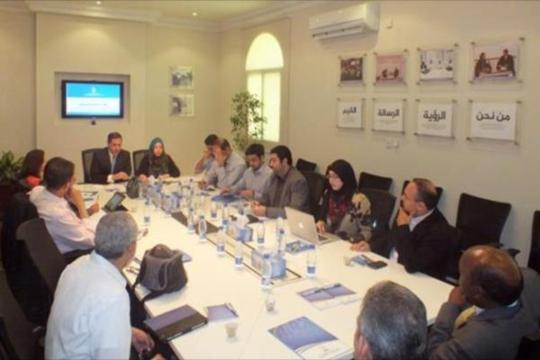
 |
| [AlJazeera] |
AlJazeera Centre for Studies hosted a roundtable on Monday, 25 August 2014, in which visiting researcher Dr. Ghassan Shabaneh, presented a paper titled “Implications of Israel’s Aggression on Gaza”. The roundtable was attended by AlJazeera’s Director General, Dr. Mostefa Souag, who also spoke briefly about the network’s coverage of Gaza and wider implications of this coverage on the regional and international levels.
Dr. Shabaneh framed the discussion around several key implications of Israel’s Operation Protective Edge, including the fact that this latest round of Israeli aggression has created serious differences inside Israel’s elite circles on the concept of Zionism, brought to question Benjamin Netanyahu’s leadership, raised serious doubts about the Iron Dome’s strength, gave new life to Hamas and spurred unprecedented Western media coverage which was, for the first time, overwhelmingly critical of Israel’s crimes against Gazans.
In comments about how AlJazeera has approached Gaza coverage this time around, Dr. Souag said he believed AlJazeera and new media are two factors directly linked to the positive trend of unbiased Western media coverage on Gaza. He believes there are two key features making the network’s coverage of such significant events unique and challenging other networks to constantly improve their coverage: “First, AlJazeera has consistently stuck to its editorial policy of standing with the people…standing with humanity and its causes; and second, AlJazeera focuses on significant events and dedicates much of its manpower and resources to coverage, with entire offices dedicated to coverage rather than just one or two reporters”.
Dr. Salah Eddin Elzein, Centre for Studies director, also contributed several factors which deserve further research if analysts and policymakers are to develop a conceptual understanding of Palestine-Israeli relations for the future. He indicated that while there is a clear gap between Israeli elites, there is also an emerging gap within the Israeli public. In terms of solidarity movements for Gaza (which have been highly vocal), there has been a more international than Arab solidarity movement, and Dr. Elzein indicated that this is an important phenomenon to study. As for movements within Palestine and following what Dr. Shabaneh spoke about in terms of Hamas’ rebirth, Dr. Elzein mentioned that it would be important to study how Hamas’ changed dynamic has impacted Fatah and other Palestinian factions.
The discussion, moderated by Dr. Fatima al-Smadi, researcher at the Centre for Studies, ended with several predictions on the future of a ceasefire between Palestinians and Israelis as well as assurances by Dr. Souag that AlJazeera currently has a war crimes documentation unit dedicated to pinpointing Israeli crimes against humanity in Gaza. Dr. Shabaneh explained that the mind-set of “resistance”, largely attributed to Hamas, was a mind-set which other factions, such as Fatah, were learning to adopt, because the alternative is “death at the checkpoints”. While the Zionist narrative has continued to centre around violence, rockets on Tel Aviv this time around have prompted calls for the violence to be contained and to remain far away from Israeli citizens and settlers.